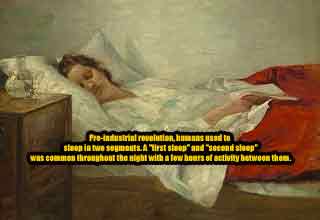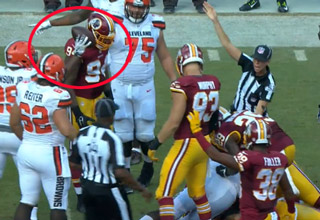25 Facts About the Industrial Revolution That Changed the World
PocketEpiphany
Published
05/21/2023
in
ftw
The Industrial Revolution jumpstarted modern society as we know it. Unfortunately, most people know nothing of this time except half-remembered lectures from middle school. What, then, was the Industrial Revolution REALLY like? Check out these weird facts to find out!
- List View
- Player View
- Grid View
Advertisement
-
1.
 The rivalry between Manchester United and Liverpool began during the industrial revolution when Manchester built a canal to circumvent Liverpool to avoid paying fees for importing/exporting goods through their port. -u/opulent321
The rivalry between Manchester United and Liverpool began during the industrial revolution when Manchester built a canal to circumvent Liverpool to avoid paying fees for importing/exporting goods through their port. -u/opulent321 -
2.
 In England prior to the mid-17th Century, Christmas was a twelve-day festival, and included the burning of the Yule log and playing traditional games. The Cromwellian Revolt abolished Christmas, and the Industrial Revolution eroded the customs in communities that tried to hold onto them. -u/GlitchedGamer14
In England prior to the mid-17th Century, Christmas was a twelve-day festival, and included the burning of the Yule log and playing traditional games. The Cromwellian Revolt abolished Christmas, and the Industrial Revolution eroded the customs in communities that tried to hold onto them. -u/GlitchedGamer14 -
3.
 In a 2002 BBC poll to select the 100 greatest Britons of all time, the industrial revolution era civil and mechanical engineer Isambard Kingdom Brunel (best known for designing the great western railway) came in second place over Shakespeare, Darwin, Newton and Cromwell among others. -u/LogicBomb69
In a 2002 BBC poll to select the 100 greatest Britons of all time, the industrial revolution era civil and mechanical engineer Isambard Kingdom Brunel (best known for designing the great western railway) came in second place over Shakespeare, Darwin, Newton and Cromwell among others. -u/LogicBomb69 -
4.
 Most cities have poorer areas in the east, due to prevailing winds carrying smoke and odors that way during the Industrial Revolution. -u/hnewbs
Most cities have poorer areas in the east, due to prevailing winds carrying smoke and odors that way during the Industrial Revolution. -u/hnewbs -
5.
 The use of cakes to celebrate special events goes back to Ancient Greece, where moon shaped cakes were adorned with candles in the Temple of Artemis. It wasn’t till the Industrial Revolution that new techniques made them widely available and associated with the celebration of a child’s birth. -u/Cosmohumanist
The use of cakes to celebrate special events goes back to Ancient Greece, where moon shaped cakes were adorned with candles in the Temple of Artemis. It wasn’t till the Industrial Revolution that new techniques made them widely available and associated with the celebration of a child’s birth. -u/Cosmohumanist -
6.
 Romans were so technologically advanced that the global lead production at around 1 CE would not be surpassed again until the Industrial Revolution, 1750 years later. -u/seanchea
Romans were so technologically advanced that the global lead production at around 1 CE would not be surpassed again until the Industrial Revolution, 1750 years later. -u/seanchea -
7.
 John "Blind Jack" Metcalf, despite being blind since the age of Six, was an accomplished diver, swimmer, card player and fiddler and the first professional road builder to emerge from the Industrial Revolution. -u/Veldron
John "Blind Jack" Metcalf, despite being blind since the age of Six, was an accomplished diver, swimmer, card player and fiddler and the first professional road builder to emerge from the Industrial Revolution. -u/Veldron -
8.
 Some children during the Industrial Revolution were so poor their schools had to lend them shoes - and stamp them with a warning not to pawn them for money for food. -u/KatMuseums
Some children during the Industrial Revolution were so poor their schools had to lend them shoes - and stamp them with a warning not to pawn them for money for food. -u/KatMuseums -
9.
 Today I learned about the Long Depression, which was a period of major economic downturn directly following the Second Industrial Revolution. It was dubbed the Great Depression until the crash of 1929. -u/BungalowHole
Today I learned about the Long Depression, which was a period of major economic downturn directly following the Second Industrial Revolution. It was dubbed the Great Depression until the crash of 1929. -u/BungalowHole -
10.
 The word sabotage is derived from 'sabot' which were wooden shoes workers would throw into the gears of machinery as protest during the early industrial revolution to stop production. -u/acacia-club-road
The word sabotage is derived from 'sabot' which were wooden shoes workers would throw into the gears of machinery as protest during the early industrial revolution to stop production. -u/acacia-club-road -
11.
 The Industrial Revolution led to an expansion in branding - when makers started selling their goods beyond the local markets, the public did not find generic non-local goods trustworthy enough. To stop this, branding became a common way of making a product more recognizable and creating trust. -u/YourOwnBiggestFan
The Industrial Revolution led to an expansion in branding - when makers started selling their goods beyond the local markets, the public did not find generic non-local goods trustworthy enough. To stop this, branding became a common way of making a product more recognizable and creating trust. -u/YourOwnBiggestFan -
12.
 Before the Industrial Revolution, many dental problems (cavities, plaque buildup, misaligned teeth) were limited by a diet of hard, unprocessed, unsweetened foods. Natural selection has not prepared us for soft, processed, sugary foods. -u/wjbc
Before the Industrial Revolution, many dental problems (cavities, plaque buildup, misaligned teeth) were limited by a diet of hard, unprocessed, unsweetened foods. Natural selection has not prepared us for soft, processed, sugary foods. -u/wjbc -
13.
 During the industrial revolution, toxic metals such as Copper Arsenite, Red Lead and Vermillion (Mercury) were used as food coloring for everyday foods like milk, cheese and tea. -u/gramturismo
During the industrial revolution, toxic metals such as Copper Arsenite, Red Lead and Vermillion (Mercury) were used as food coloring for everyday foods like milk, cheese and tea. -u/gramturismo -
14.
 During the industrial revolution, when the alarm clock was still deemed too expensive by many in the working class, there were professional Knocker Uppers to bang on your window to wake you up! -u/dracoNiiC
During the industrial revolution, when the alarm clock was still deemed too expensive by many in the working class, there were professional Knocker Uppers to bang on your window to wake you up! -u/dracoNiiC -
15.
 Pre-industrial revolution, humans used to sleep in two segments. A "first sleep" and "second sleep" was common throughout the night with a few hours of activity between them. -deleted user
Pre-industrial revolution, humans used to sleep in two segments. A "first sleep" and "second sleep" was common throughout the night with a few hours of activity between them. -deleted user -
16.
 After the Industrial Revolution began in the mid 1700s, human population grew from 700M to 1B by the year 1800 - an increase of 45%. The figure stood at 2B in the year 1927 at 100% in around 130 years, and at the beginning of the 21st Century it was 6B at 400% in a little over 70 years. -u/LegendaryFalcon
After the Industrial Revolution began in the mid 1700s, human population grew from 700M to 1B by the year 1800 - an increase of 45%. The figure stood at 2B in the year 1927 at 100% in around 130 years, and at the beginning of the 21st Century it was 6B at 400% in a little over 70 years. -u/LegendaryFalcon -
17.
 Sewer Socialists got their name from their perpetual boasting about the public sewer system in Milwaukee. They fought to clean up the pollution of the Industrial Revolution, setting up new sanitation systems, city-owned water and power systems, and improving education in Wisconsin. -u/YALANCI
Sewer Socialists got their name from their perpetual boasting about the public sewer system in Milwaukee. They fought to clean up the pollution of the Industrial Revolution, setting up new sanitation systems, city-owned water and power systems, and improving education in Wisconsin. -u/YALANCI -
18.
 Rickets is called "The English Disease" in some languages, after the thick smog during the industrial revolution in England gave up to 80% of children a vitamin-D deficiency. -u/violetgibson
Rickets is called "The English Disease" in some languages, after the thick smog during the industrial revolution in England gave up to 80% of children a vitamin-D deficiency. -u/violetgibson -
19.
 The modern British accent was originally an affectation adopted by the nouveau riche during the Industrial Revolution to make them sound more prestigious. -u/ThatAssholeMrWhite
The modern British accent was originally an affectation adopted by the nouveau riche during the Industrial Revolution to make them sound more prestigious. -u/ThatAssholeMrWhite -
20.
 The peppered moth evolved to a darker color due to coal pollution during the Industrial Revolution. It then became lighter after pollution regulations cut down sooty coal emissions. -u/smokeythel3ear
The peppered moth evolved to a darker color due to coal pollution during the Industrial Revolution. It then became lighter after pollution regulations cut down sooty coal emissions. -u/smokeythel3ear -
21.
 Not James Watt invented the steam engine but Thomas Newcomen. Watt only made it more efficient which then caused the industrial revolution. -u/b_lumenkraft
Not James Watt invented the steam engine but Thomas Newcomen. Watt only made it more efficient which then caused the industrial revolution. -u/b_lumenkraft -
22.
 As the printing press launched an intellectual revolution, the machine lathe launched the industrial revolution. -u/photolouis
As the printing press launched an intellectual revolution, the machine lathe launched the industrial revolution. -u/photolouis -
23.
 It’s argued that the spread of caffeinated beverages in the 17th century made the Industrial Revolution possible by allowing large numbers of people to coordinate their work schedules and work longer hours. Before coffee/tea were widely available beer was the European breakfast drink of choice. -u/mcardina
It’s argued that the spread of caffeinated beverages in the 17th century made the Industrial Revolution possible by allowing large numbers of people to coordinate their work schedules and work longer hours. Before coffee/tea were widely available beer was the European breakfast drink of choice. -u/mcardina -
24.
 The oceans are 30% more acidic since the Industrial Revolution. -u/Hachidream
The oceans are 30% more acidic since the Industrial Revolution. -u/Hachidream
- NEXT GALLERY
-

- Nonchalant Compilation of 34 Remarkable Images
The rivalry between Manchester United and Liverpool began during the industrial revolution when Manchester built a canal to circumvent Liverpool to avoid paying fees for importing/exporting goods through their port. -u/opulent321
24/24
1/24








2 Comments